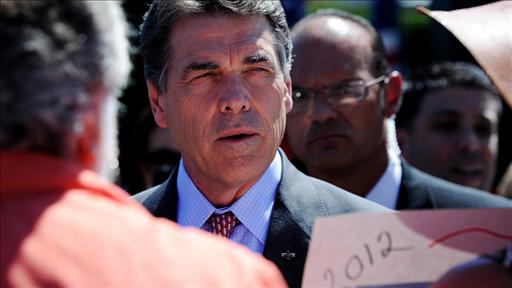Doubts About Perry Echo Those Faced by Reagan
By Gerald F. Seib
WSJ.com
The rap on Rick Perry is that he's too ideologically extreme to be elected in a general election, precisely the same rap that Ronald Reagan faced in 1980. Could Perry be another Reagan? Jerry Seib looks at the similarities on The News Hub.
It was appropriate that the first Republican presidential debate in which Rick Perry appeared was at Ronald Reagan's presidential library last week, for it is the Reagan precedent that offers the greatest hope for the Texas governor's presidential bid.
As the candidates gathered Monday night in
Florida for a debate staged by tea-party activists,
there was little doubt Gov. Perry has become the
front-runner, as seen in the way other candidates
focused their jabs at him. A national poll by debate
co-sponsor CNN showed him leading former
Massachusetts Gov. Mitt Romney 32% to 21%. Yet the
question that nags Republicans about Mr. Perry is a
simple one: Is he too ideological, too conservative
or too extreme to win a general election?
As it happens, that is the same question that
dogged Ronald Reagan in 1980, right up until he won
a smashing general-election victory over President
Jimmy Carter. So maybe the real question is whether
Rick Perry could be another Ronald Reagan.
Some similarities are striking. Then, as now,
Republicans were facing a race against an incumbent
wrestling with severe economic problems (inflation
then, joblessness now). Then, as now, a safer and
more moderate establishment choice was an early
favorite. Then, it was George H.W. Bush; now, Mr.
Romney plays that role.
But the candidate who excited conservatives was
Mr. Reagan, the former California governor, in much
the way Mr. Perry gets conservative juices flowing.
Mr. Reagan, like Mr. Perry, had a long record
running one of the nation's largest states, and he
brought to the campaign the same kind of disdain for
Washington's established ways. He famously declared
that government wasn't the solution to the nation's
economic problems, but rather the problem. He said
energy shortages were caused by government
interference with the oil industry.
He offered simple solutions. He proposed
eliminating entire government agencies and pushed a
tax-cut plan that was considered radical. Much as
Mr. Perry drew fire for his contention in last
week's debate that the science behind global warming
hasn't been proven, Mr. Reagan was attacked for his
contention that forests' hydrocarbon production was
as big a contributor to smog as were machines.
"Trees cause more pollution than automobiles do," he
once said, prompting hecklers at one campaign stop
to hang a sign from a tree reading, "Stop me before
I kill again."
Even Mr. Perry's declaration that Social Security
is a "Ponzi scheme," much discussed in Monday's
debate, has a parallel in the 1980 campaign. Mr.
Carter deployed a 1961 recording of a speech Mr.
Reagan had made questioning the wisdom of both
Social Security and Medicare.
All of this left even many Republicans worrying
that Mr. Reagan, whatever his popularity with the
GOP base, was too far out of the mainstream to win.
No less an authority than former President Gerald
Ford—who briefly considered running against Mr.
Reagan in 1980—declared: "A very conservative
Republican cannot win in a national election."
Now some conservatives see a similar mindset at work. "The GOP establishment's hand-wringing over conservatives who, in their minds, cannot beat Barack Obama is beyond tired rhetoric that needs to be rested once and for all," argues Keith Appell, a conservative GOP activist.
Yet there also are significant differences
between then and now. By 1980, Mr. Reagan was quite
well known nationally; indeed, he had come within a
whisker of winning his party's nomination in 1976.
Mr. Perry, by contrast, is relatively unknown
nationally and has had less chance to make Americans
comfortable with him.
While Mr. Reagan was sharply ideological in many
of his policy positions, he didn't have many sharp
edges personally. His style was almost avuncular.
And his record in governing California also was more
moderate than his rhetoric, for running California
in the 1960s required working intensively with
Democrats. Those attributes are less true of Mr.
Perry.
And certainly there are significant differences
on the Democratic side of the equation. For all his
economic problems, Mr. Obama is, polls suggest,
better liked and more generally respected than was
Mr. Carter by 1980. Moreover, Mr. Carter was weighed
down by international problems, while national
security actually is a relative strong suit for Mr.
Obama. While Iran's Ayatollah Khomeini was
embarrassing Mr. Carter by allowing Americans to be
held hostage in Iran, Mr. Obama succeeded in
knocking off Osama bin Laden, successor to Ayatollah
Khomeini as Americans' most despised foe.
So the parallels aren't perfect, and the "electability" debate is likely to grow. Yet it isn't clear how much Republican primary voters care. In the new CNN poll, 42% of them said Mr. Perry has the best chance of beating Mr. Obama, compared with 26% for Mr. Romney.


